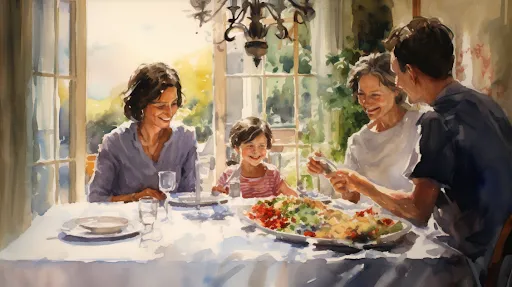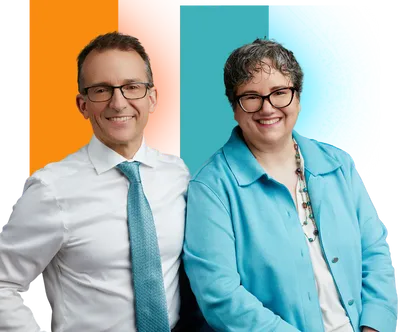
How Trauma Affects Relationships: Part 2
Healing together after trauma isn’t about fixing what’s broken — it’s about learning how to feel safe again, side by side. With patience, empathy, and steady communication, love can become a place of healing, not pain.
This article is the continuation from the part 1. If you have not read the part 1, you can read it first by >> clicking here <<.
You can listen to the podcast episode, or read below:
Ever pondered why relationships feel like rollercoasters?
Buckle up . . . because we're about to deep-dive into the amazing world of relationship patterns.
But first, the story...
Did you know that our past experiences can cast long shadows over our relationships, affecting them in ways we might not even realize?
Our relationships are like jigsaw puzzles. Some pieces fit perfectly while others... “not so much”.
Have you ever wondered why? Our experiences, especially the painful ones, play a big role in shaping our relationships – some short-lived, others longer-lasting.
So, let's take a closer look. . .
Once again, welcome to another episode of our journey into understanding how trauma affects relationships. In this instalment, we dive into the concept of the five collateral pattern relationships, which is a continuation of our discussion from the previous episode.
Our insights are drawn from a paper by Carmen Lynch, a seasoned therapist, and Dr. Daniels, an emeritus professor at Sonoma State University. These patterns categorize relationships into two distinct groups: the five dominant patterns and the five collateral patterns, the latter being the focus of this episode.
Understanding The Brain - Relationship Connection
Our brain, a magnificent organ, controls everything we do – including how we love, trust, and bond.
It's fascinating, isn’t it?
The Influence of Trauma
Think about it. . .
A young child, who witnesses their parents' divorce, might grow up with an inherent fear of commitment. Why? It's not just an emotional scar; their brain has been wired to be cautious, to avoid potential pain.
The experiences we endure, especially traumatic ones, play puppeteer with our brain, determining how we react, trust, and even love.
Understanding the Patterns
It wasn't just an emotional barrier; it was our brain safeguarding us.
Every time we took a step towards commitment, our brain reminded us of the past hurt, urging us to retreat.
Ever noticed two friends, both from broken homes, handling love differently?
It's important to note that partners in collateral pattern relationships don't necessarily evolve at the same pace or in the same direction. This divergence can create the appearance of a misfit or a significant lack of alignment.
Factors contributing to this lack of fit can range from age differences to physical distances, varying attitudes, and divergent life experiences. Often, the root of these disparities can be traced back to past traumas—whether ancient, recent, or somewhere in between.
In the next segments of this episode, we'll understand these in greater detail, shedding light on their dynamics and how they intersect with the impacts of trauma.
The Five Collateral Pattern Relationships
The Healing Relationship
Picture this: you've had a rough time. Maybe a loss or a heartbreak. In comes someone. They’re like a band-aid. You bond over shared stories of past pain. You talk. And talk. And, guess what? More talking! Mostly about what hurt you before. And when it ends? Well, it's not "goodbye" but more like "see you later, friend!" It's the kind of relationship where growing, and sometimes moving apart happen.
🤓 Fun Fact: You may have heard about the Globetrotter who chased love on the internet back in the early 2000s? What might seem commonplace now was groundbreaking back then!
And, boy. . , did his family not approve.
But isn’t it interesting how these stories give us insights into how we heal in relationships?
The Experimental Relationship
Ever felt like taking a walk on the wild side? Like choosing someone entirely different from your usual type?
Here’s a fun one. Imagine someone always dating people who remind them of their parent. Suddenly, they decide, "I want something different!"
That's experimental. It’s fresh. Exciting. It’s about stepping outside our comfort zone. Kind of like when teenagers are discovering... well, everything!
The Transitional Relationship
Ready for a change?
Transitional relationships are like bridges. They help us move from the old to the new. Think of it like the next season of your favorite show. Old stories meet new twists. And, while we’re figuring out the "new," we’re also revisiting the "old" – but with fresh eyes.
Remember the lady who was lied to?
When she met someone honest, it wasn’t rainbows instantly. But with time, she evolved. She found her voice. She stood up for herself. And the relationship? It became the stepping stone for her brighter, happier future.
Avoidance Relationships
Ever tried to avoid someone or something? We all have!
Sometimes, past hurts make us build walls. Huge ones. Like the guy, Ecuador. After a messy end to a decade-long marriage, he hopped from one relationship to another.
It took him a whopping 15 years to let someone back in. Why? Because sometimes our heart needs time. A LOT of time.
Pastime Relationships
Lastly, imagine two pals. They hang out, have fun, but with no strings attached. Just pure, unadulterated fun.
Friends with benefits, you say? Exactly!
Sometimes, our relationships are just that – for fun. And fun doesn't mean it's without feelings. It's just... casual. Easy-breezy. Light. But every relationship, even the fun ones, can teach us something.
Growth in Trauma-affected Relationships
Collateral pattern relationships are characterized by their temporary nature, typically lasting from a few weeks to a few years. They often emerge following a period of hardship, loss, stress, or mourning in an individual's life, leaving them feeling wounded and in need of nurturing care.
Simultaneously, this phase encourages self-reflection and personal growth.
Every choice we make. . Every person we trust. . , and every bond we form are reflections of our past, the lessons we've learned, and the growth we're undergoing.
With the right help, time, or simply by choosing healthier relationships, we can reprogram our minds, build resilience, and enjoy more fulfilling relationships.
“ Our relationships are more than just heart-to-heart connections; they're brain-to-brain dialogues. “
Relationships? They're journeys. Some are short trips; others are long hauls.
But each one? A learning experience.
Intrigued?. . Craving more insights?
If you are ready, would like to get help and want to learn more how to start your decluttering journey, click on this link, enter your information and CHECK OUT THE VIDEO ▶️.
Your heart, and brain, will thank you for it! And remember, you create the life you want ♥
FREQUENTLY ASKED QUESTIONS
Can relationships heal after trauma?
Yes — with empathy, consistency, and space to grow at your own pace. Healing doesn’t erase the past, but it can build a new kind of closeness rooted in understanding.
What helps rebuild trust after trauma?
Small, repeated moments of safety — like keeping promises, listening fully, and being honest about emotions. Trust returns through patterns, not promises.
How can I avoid re-triggering my partner?
You can’t avoid every trigger, and that’s okay. What matters most is staying curious, asking what helps them feel safe, and responding with care instead of fear.




